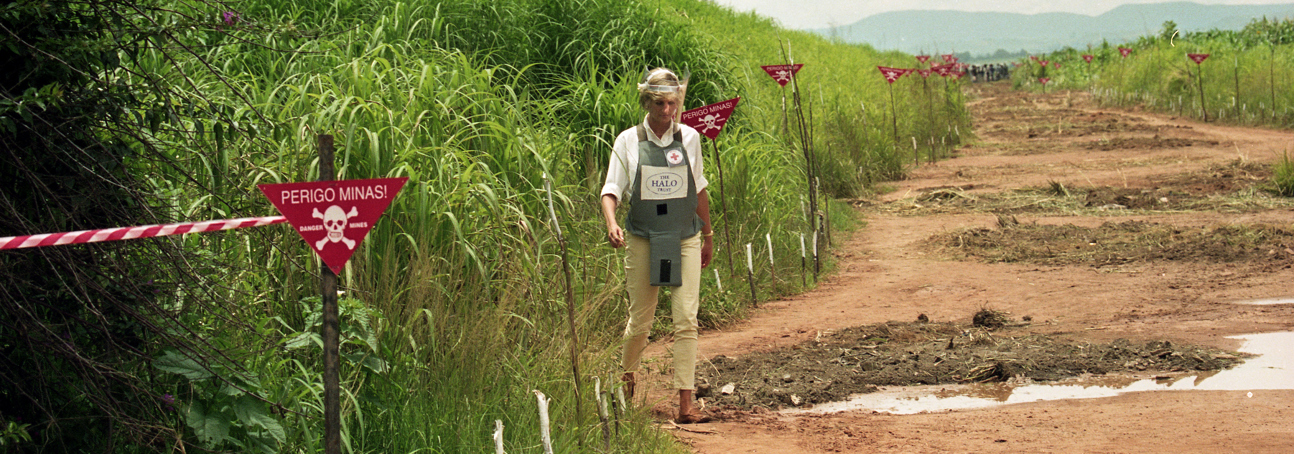20 Years after Diana's visit, landmines are still killing Angola's children
2017 is the year to re-focus, re-energise and finish the job.
20 years since Diana, Princess of Wales walked through a minefield in Angola, The HALO Trust says that mines and unexploded ordnance are still harming civilians and hindering development in Angola and in 63 other countries and territories around the world.
In September 2016 eight people from the same family were killed near Kuito, a town visited by Diana, when a child brought an anti-tank mine into his home. Another child was killed and a further two suffered amputations after encountering an unexploded mortar in Huambo City, only 5 km from where the princess visited.
Diana's 1997 visit to Angola raised global awareness of the plight of landmine victims and the indiscriminate nature of the weapons. States came together later that year to sign the Mine Ban Treaty in Ottawa. Despite the Treaty's huge success in stopping landmine production and transfer, HALO says that the Treaty's proposed 2025 deadline for a mine free world will not be met without a substantial increase in funding for mine clearance.
Staff from HALO, the world's largest and oldest mine clearance charity, were in the process of clearing the minefield Diana walked through on 15 January 1997. Since then HALO has destroyed more than 92,000 landmines, 800 minefields and 162,000 shells, missiles and bombs in Angola.
The minefield where Diana walked is now a thriving community with housing, a carpentry workshop, a small college and a school. But there is still much to be done. Most of the cities in Angola have been cleared but rural areas remain heavily mined and over 40% of the population lives in the countryside. There are 630 minefields remaining in the eight provinces in which HALO works, and perhaps more than 1,000 minefields remaining across the country.
A sharp decline in international assistance has forced HALO to reduce its local demining teams from 1,200 personnel to just 250 in the last few years. Today, fleets of armoured vehicles and specialist equipment are inactive due to lack of funds. Hundreds of trained Angolan de-miners are now unemployed. Meanwhile, estimates for the total number of casualties from landmines and explosive items in Angola vary considerably, from 23,000 to 80,000. The size of the country and length of its conflict have hindered efforts to keep reliable records.
The slow progress of Angola clearance contrasts with that of Mozambique, which was finally declared free of mines in 2015 after 22 years of work by HALO and other operators.
James Cowan, CEO of HALO, said: 'The world cannot turn its back on Angola now that Mozambique has shown us what can be done with the right commitment and determination. All people deserve to be free of the debris of war: its removal is the first step towards regrowth, development and peace. Yet 20 years after Diana's visit to Angola, children are still being killed and maimed by mines. 2017 is the year to re-focus, re-energise and finish the job. Together the world can achieve the Ottawa Treaty's vision of a mine-free world.'
There are 64 states and territories affected by mines and other items of unexploded ordnance such as cluster munitions and improvised explosive devices (IEDs). Cambodia, Sri Lanka, Angola and Afghanistan are among the most severely mine-afflicted states in the world, while Syria, Yemen and Iraq face hugely insecure futures due to the prolific use of IEDs in contemporary conflicts. The Landmine Monitor recently reported that 6,461 people were known to be wounded or killed by landmines and other explosive remnants of war in 2015 - a 75% increase from 2014 and the highest reported casualty total since 2006's figure of 6,573.
For interviews with James Cowan and HALO personnel who accompanied Diana please call Louise Vaughan on 0044 7984 203075 or Paul McCann on 0044 7967 853217 or email louise.vaughan@halotrust.org or paul.mccann@halotrust.org.
For high resolution images please visit our Press Office Media Resources
For US enquiries after 14:00 ET, please contact Amy Currin on 001.415.609.0696
#LandmineFree2025


